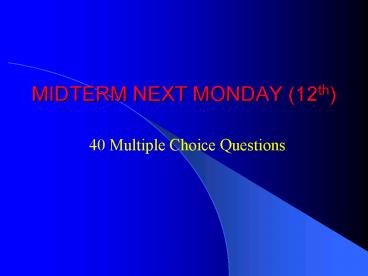MIDTERM NEXT MONDAY (12th) - PowerPoint PPT Presentation
1 / 22
Title:
MIDTERM NEXT MONDAY (12th)
Description:
Title: PowerPoint Presentation Author: Gerard W Boychuk Last modified by: WLU Created Date: 1/7/2002 2:17:05 AM Document presentation format: On-screen Show – PowerPoint PPT presentation
Number of Views:59
Avg rating:3.0/5.0
Title: MIDTERM NEXT MONDAY (12th)
1
MIDTERM NEXT MONDAY (12th)
- 40 Multiple Choice Questions
2
Lecture on Thursday (Feb.7)
- Prof. Shamsie
- Good Governance and the Case of Brazil
3
Attributes of Democratic Government
- Political equality
- Majority rule
- Popular sovereignty
- Political liberty (rights and freedoms)
- Minority rights
- Political competition
- Rule of law
- How do we design Democracy to achieve these
ideals?? How do we embed these ideals in
institutions and processes?
4
Democratic countries have varying degrees of
success with this.
- Eg. Constitutions and how rights are framed
- which rights included? how are they protected?
- Eg. Parliamentary vs. presidential systems
- different (and partial) paths to popular
sovereignty - Eg. SMPS vs. PR electoral systems
- majority rule vs. minority rights
- and incentives for political parties
5
But what do institutions and processes in
nondemocratic countries look like?
- Can countries be sort of democratic?
6
The Islamic Republic of Iran
7
Peoples Republic of China
8
Nondemocratic Countries
- February 5th
9
Authoritarian Governments
- Authoritarianism umbrella term for governments
whose authority is not put to test in elections
(but not totalitarian), opposition not tolerated
(text p.25) - but, great variation!
- right-wing (conservative) ? Saudi Arabia,
military governments (Latin America) - left-wing (socialist) ? China, Russia
10
- Democratic Nondemocratic
- Government Government
- Political equality Political inequality
- Majority rule Elite rule
- Popular sovereignty Tyranny, oligarchy
- Political liberty Political subjugation
- Minority rights Repression of minorities
- Political competition Power monopoly
- Rule of law Arbitrary rule (rule by
law)
11
- Democratic Nondemocratic
- Government Government
- Political equality Political inequality
- Majority rule Elite rule
- Popular sovereignty Tyranny, oligarchy
- Political liberty Political subjugation
- Minority rights Repression of minorities
- Political competition Power monopoly
- Rule of law Arbitrary rule
12
The Islamic Republic of Iran
13
Governmental System
- A theocracy (rule by clerics) with some
concessions to democracy - principle of jurists guardianship (jurist
legal scholar steeped in Islamic religious law) - Supreme (religious) Leader Ayatollah Ali
Khameini - has wide-ranging powers, link between three
branches of govt, can dismiss President,
controls armed forces, judiciary, media - all laws must conform to sharia and clergy are
ultimate interpreters
14
Iranian Governmental System
Majles (290 deputies, 4-yr terms)
President (4-yr term)
Head of Judiciary
Public Courts
Cabinet
Revolutionary Courts
Special Clerical Court
Bureaucracy
People
15
Iranian Governmental System
Supreme Leader
Assembly of Religious Experts (86, 8-yr terms)
Military
Council of Guardians
Revolutionary Guard
Expediency Council
President (4-yr term)
Head of Judiciary
Majles (290 deputies, 4-yr terms)
Public Courts
Cabinet
Revolutionary Courts
Special Clerical Court
Bureaucracy
People
16
Political Equality?
- Council of Guardians vets all political
candidates - barred 2000 candidates from contesting 2004
parliamentary elections (85 of which were
reformists in current parliament) - Women may vote, run for office, but many do not
exercise these rights - Civic organizations allowed as long as they do
not question basis of the Islamic Republic
(guided democracy)
17
Majority Rule?
- Iranians cannot change their government
democratically - Supreme Leader appointed for life
- Council of Guardians not elected
18
Popular Sovereignty?
- Unelected Council of Guardians approves all
legislation passed by parliament - regularly vetoes legislation
- Local elections introduced in 1999
- overwhelming support for reformers
19
Political Liberty?
- Citizens (esp. dissidents), MPs subjected to
arbitrary arrest and detention - Freedom of expression is limited, media
controlled - Freedom of association limited
- public demonstrations that violate principles of
Islam prohibited - Religious freedom limited (majority us Shia
muslim) - Morals police practice intimidation
20
Minority Rights?
- Additional seats in Majles are reserved for
non-Muslim deputies - religious minorities may practice their faith but
cannot hold senior govt positions, face
restrictions in education, property ownership - Bahais face official discrimination
- Ethnic minorities permitted to establish
associations
21
Political Competition?
- No competition for most powerful posts in govt
(Council of Guardians, Supreme Leader) - Competition for parliamentary seats (reform
candidates) restricted
22
Rule of Law?
- Judiciary is not independent
- Supreme Leader appoints Chief Justice, who then
appoints other judges - Political and sensitive cases are tried in the
Revolutionary Courts (due process often ignored)































